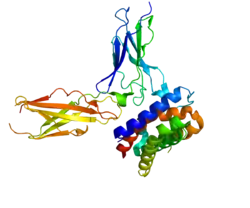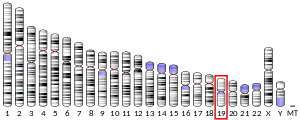Interleukin 29
Interleukin-29 (IL-29) is a cytokine and it belongs to type III interferons group, also termed interferons λ (IFN-λ). IL-29 (alternative name IFNλ1) plays an important role in the immune response against pathogenes and especially against viruses by mechanisms similar to type I interferons, but targeting primarily cells of epithelial origin and hepatocytes.[3][4]
IL-29 is encoded by the IFNL1 gene located on chromosome 19 in humans.[3][5] It is a pseudogene in mice meaning the IL-29 protein is not produced in them.[3]
Structure
IL-29 is, with the rest of IFN-λ, structurally related to the IL-10 family, but its primary amino acid sequence (and also function) is more similar to type I interferons.[3] It binds to a heterodimeric receptor composed of one subunit IFNL1R specific for IFN-λ and a second subunit IL10RB shared among the IL-10 family cytokines.[3]
Function
Effects on immune response to pathogenes
IL-29 exhibits antiviral effects by inducing similar signaling pathways as type I interferons.[3] IL-29 receptor signals through JAK-STAT pathways leading to activated expression of interferon-stimulated genes and production of antiviral proteins.[6] Further consequences of IL-29 signalization comprise the upregulated expression of MHC class I molecules,[3] or enhanced expression of the costimulatory molecules and chemokine receptors on pDC, which are the main producers of IFN-α.[6]
IL-29 expression is dominant in virus-infected epithelial cells of the respiratory, gastrointestinal and urogenital tracts, also in other mucosal tissues and skin. Hepatocytes infected by HCV or HBV viruses stimulate the immune response by producing IL-29 (IFN-λ in general) rather than type I interferons.[3][4] It is also produced by maturing macrophages, dendritic cells or mastocytes.[4]
It plays a role in defense against pathogens apart from viruses.[3] It affects the function of both innate and adaptive immune system. Besides described antiviral effects, IL-29 modulates cytokine production of other cells, for example, it increases secretion of IL-6, IL-8 and IL-10 by monocytes and macrophages, enhances the responsiveness of macrophages to IFN-γ by increased expression of IFNGR1, stimulates T cell polarization towards Th1 phenotype and also B cell response to IL-29 was reported.[6]
Antitumor immunity
The impact of IL-29 on cancer cells is complicated depending on cancer cell type. It shows protective tumor inhibiting effects in many cases such as skin, lung, colorectal or hepatocellular cancer, but shows tumor promoting effects on multiple myeloma cells.[4] IFN-λ have potential as cancer therapy, with effects on more restricted cell types and fewer side-effects than type I interferons.[3][4]
Autoimmune diseases
Abnormal expression of IL-29 could be involved in the pathogenesis of the autoimmune diseases by enhancing the production of inflammatory cytokines, chemokines, and other autoimmune‐related components. High levels of IL-29 in serum or disease-specific tissue was observed in patients with rheumatoid arthritis, osteoarthritis, systemic lupus erythematosus, Sjögren's syndrome, psoriasis, atopic dermatitis, Hashimoto's thyroiditis, systemic sclerosis and uveitis.[6]
References
- GRCh38: Ensembl release 89: ENSG00000182393 - Ensembl, May 2017
- "Human PubMed Reference:". National Center for Biotechnology Information, U.S. National Library of Medicine.
- Lazear HM, Nice TJ, Diamond MS (July 2015). "Interferon-λ: Immune Functions at Barrier Surfaces and Beyond". Immunity. 43 (1): 15–28. doi:10.1016/j.immuni.2015.07.001. PMC 4527169. PMID 26200010.
- Kelm NE, Zhu Z, Ding VA, Xiao H, Wakefield MR, Bai Q, Fang Y (October 2016). "The role of IL-29 in immunity and cancer". Critical Reviews in Oncology/Hematology. 106: 91–8. doi:10.1016/j.critrevonc.2016.08.002. PMC 7129698. PMID 27637354.
- "Entrez Gene: interleukin 29 (interferon".
- Wang JM, Huang AF, Xu WD, Su LC (December 2019). "Insights into IL-29: Emerging role in inflammatory autoimmune diseases". Journal of Cellular and Molecular Medicine. 23 (12): 7926–7932. doi:10.1111/jcmm.14697. PMC 6850914. PMID 31578802.
Further reading
- Pagliaccetti NE, Eduardo R, Kleinstein SH, Mu XJ, Bandi P, Robek MD (October 2008). "Interleukin-29 functions cooperatively with interferon to induce antiviral gene expression and inhibit hepatitis C virus replication". The Journal of Biological Chemistry. 283 (44): 30079–89. doi:10.1074/jbc.M804296200. PMC 2662072. PMID 18757365.
- Li MC, Wang HY, Wang HY, Li T, He SH (April 2006). "Liposome-mediated IL-28 and IL-29 expression in A549 cells and anti-viral effect of IL-28 and IL-29 on WISH cells". Acta Pharmacologica Sinica. 27 (4): 453–9. doi:10.1111/j.1745-7254.2006.00292.x. PMID 16539846.
- Megjugorac NJ, Gallagher GE, Gallagher G (December 2009). "Modulation of human plasmacytoid DC function by IFN-lambda1 (IL-29)". Journal of Leukocyte Biology. 86 (6): 1359–63. doi:10.1189/jlb.0509347. PMID 19759281. S2CID 22453858.
- Uzé G, Monneron D (2007). "IL-28 and IL-29: newcomers to the interferon family". Biochimie. 89 (6–7): 729–34. doi:10.1016/j.biochi.2007.01.008. PMID 17367910.
- Hou W, Wang X, Ye L, Zhou L, Yang ZQ, Riedel E, Ho WZ (April 2009). "Lambda interferon inhibits human immunodeficiency virus type 1 infection of macrophages". Journal of Virology. 83 (8): 3834–42. doi:10.1128/JVI.01773-08. PMC 2663280. PMID 19193806.
- Magracheva E, Pletnev S, Kotenko S, Li W, Wlodawer A, Zdanov A (January 2010). "Purification, crystallization and preliminary crystallographic studies of the complex of interferon-lambda1 with its receptor". Acta Crystallographica Section F. 66 (Pt 1): 61–3. doi:10.1107/S1744309109048817. PMC 2805539. PMID 20057073.
- Stoltz M, Klingström J (September 2010). "Alpha/beta interferon (IFN-alpha/beta)-independent induction of IFN-lambda1 (interleukin-29) in response to Hantaan virus infection". Journal of Virology. 84 (18): 9140–8. doi:10.1128/JVI.00717-10. PMC 2937636. PMID 20592090.
- Brand S, Beigel F, Olszak T, Zitzmann K, Eichhorst ST, Otte JM, Diebold J, Diepolder H, Adler B, Auernhammer CJ, Göke B, Dambacher J (November 2005). "IL-28A and IL-29 mediate antiproliferative and antiviral signals in intestinal epithelial cells and murine CMV infection increases colonic IL-28A expression". American Journal of Physiology. Gastrointestinal and Liver Physiology. 289 (5): G960–8. doi:10.1152/ajpgi.00126.2005. PMID 16051921. S2CID 25466268.
- Pekarek V, Srinivas S, Eskdale J, Gallagher G (March 2007). "Interferon lambda-1 (IFN-lambda1/IL-29) induces ELR(-) CXC chemokine mRNA in human peripheral blood mononuclear cells, in an IFN-gamma-independent manner". Genes and Immunity. 8 (2): 177–80. doi:10.1038/sj.gene.6364372. PMID 17252004.
- Li M, Liu X, Zhou Y, Su SB (July 2009). "Interferon-lambdas: the modulators of antivirus, antitumor, and immune responses". Journal of Leukocyte Biology. 86 (1): 23–32. doi:10.1189/jlb.1208761. PMID 19304895. S2CID 37741272.
- Jordan WJ, Eskdale J, Boniotto M, Rodia M, Kellner D, Gallagher G (January 2007). "Modulation of the human cytokine response by interferon lambda-1 (IFN-lambda1/IL-29)". Genes and Immunity. 8 (1): 13–20. doi:10.1038/sj.gene.6364348. PMID 17082759.
- Wang J, Oberley-Deegan R, Wang S, Nikrad M, Funk CJ, Hartshorn KL, Mason RJ (February 2009). "Differentiated human alveolar type II cells secrete antiviral IL-29 (IFN-lambda 1) in response to influenza A infection". Journal of Immunology. 182 (3): 1296–304. doi:10.4049/jimmunol.182.3.1296. PMC 4041086. PMID 19155475.
- Lasfar A, Lewis-Antes A, Smirnov SV, Anantha S, Abushahba W, Tian B, Reuhl K, Dickensheets H, Sheikh F, Donnelly RP, Raveche E, Kotenko SV (April 2006). "Characterization of the mouse IFN-lambda ligand-receptor system: IFN-lambdas exhibit antitumor activity against B16 melanoma". Cancer Research. 66 (8): 4468–77. doi:10.1158/0008-5472.CAN-05-3653. PMID 16618774.
- Osterlund P, Veckman V, Sirén J, Klucher KM, Hiscott J, Matikainen S, Julkunen I (August 2005). "Gene expression and antiviral activity of alpha/beta interferons and interleukin-29 in virus-infected human myeloid dendritic cells". Journal of Virology. 79 (15): 9608–17. doi:10.1128/JVI.79.15.9608-9617.2005. PMC 1181545. PMID 16014923.
- Maher SG, Sheikh F, Scarzello AJ, Romero-Weaver AL, Baker DP, Donnelly RP, Gamero AM (July 2008). "IFNalpha and IFNlambda differ in their antiproliferative effects and duration of JAK/STAT signaling activity". Cancer Biology & Therapy. 7 (7): 1109–15. doi:10.4161/cbt.7.7.6192. PMC 2435218. PMID 18698163.
- Mennechet FJ, Uzé G (June 2006). "Interferon-lambda-treated dendritic cells specifically induce proliferation of FOXP3-expressing suppressor T cells". Blood. 107 (11): 4417–23. doi:10.1182/blood-2005-10-4129. PMID 16478884.
- Wolk K, Witte K, Witte E, Proesch S, Schulze-Tanzil G, Nasilowska K, Thilo J, Asadullah K, Sterry W, Volk HD, Sabat R (May 2008). "Maturing dendritic cells are an important source of IL-29 and IL-20 that may cooperatively increase the innate immunity of keratinocytes". Journal of Leukocyte Biology. 83 (5): 1181–93. doi:10.1189/jlb.0807525. PMID 18281438. S2CID 46765523.
- Novak AJ, Grote DM, Ziesmer SC, Rajkumar V, Doyle SE, Ansell SM (December 2008). "A role for IFN-lambda1 in multiple myeloma B cell growth". Leukemia. 22 (12): 2240–6. doi:10.1038/leu.2008.263. PMC 2771776. PMID 18830264.
- Witte K, Gruetz G, Volk HD, Looman AC, Asadullah K, Sterry W, Sabat R, Wolk K (December 2009). "Despite IFN-lambda receptor expression, blood immune cells, but not keratinocytes or melanocytes, have an impaired response to type III interferons: implications for therapeutic applications of these cytokines". Genes and Immunity. 10 (8): 702–14. doi:10.1038/gene.2009.72. PMID 19798076.
- Rauch A, Kutalik Z, Descombes P, Cai T, Di Iulio J, Mueller T, Bochud M, Battegay M, Bernasconi E, Borovicka J, Colombo S, Cerny A, Dufour JF, Furrer H, Günthard HF, Heim M, Hirschel B, Malinverni R, Moradpour D, Müllhaupt B, Witteck A, Beckmann JS, Berg T, Bergmann S, Negro F, Telenti A, Bochud PY (April 2010). "Genetic variation in IL28B is associated with chronic hepatitis C and treatment failure: a genome-wide association study". Gastroenterology. 138 (4): 1338–45, 1345.e1–7. doi:10.1053/j.gastro.2009.12.056. PMID 20060832.


